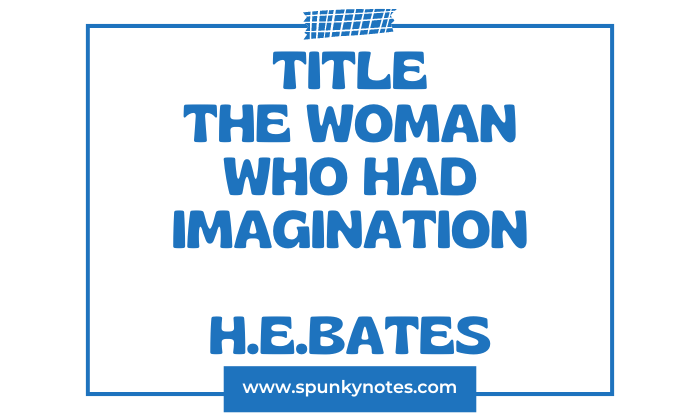
Q. What is the significance of the title of The Woman Who Had Imagination?
Introduction
“The Woman Who Had Imagination” by H.E. Bates centres around Maddalena, a character known for her creative thinking and ability to envision a world beyond her present limitations.
The title emphasizes Maddalena’s imaginative qualities, suggesting that these qualities are crucial for understanding her character and the story’s development.
Imagination as a Means of Resilience
Maddalena’s imagination is a key element of her resilience. Living in an oppressive environment, she uses her creativity to escape her life’s physical and emotional constraints mentally.
Her marriage to “the old cock,” an older, domineering husband, highlights the oppressive situation she faces. Her imaginative capacity provides a mental refuge where she can find solace and strength, demonstrating how creativity can be a vital tool for personal resilience.
Imagination and Personal Freedom
The title also underscores how Maddalena’s imaginative nature contributes to her sense of personal freedom. Despite her husband’s controlling behaviour, her internal world remains her domain.
This inner freedom is significant because it shows that individuals can maintain a sense of autonomy through their thoughts and creativity, even in restrictive environments.
Maddalena’s imagination becomes a sanctuary where she can assert her identity and independence, albeit internally.
Inner Life vs. Outer Reality
“The Woman Who Had Imagination” presents the story’s central conflict—the tension between Maddalena’s rich inner life and the harsh realities of her external environment.
This conflict is central to understanding Maddalena’s character and the challenges she faces in her daily life. Imagination is a crucial tool for Maddalena to cope with the oppressive circumstances in her life.
Living under the control of her older husband, whom the fishmonger refers to disparagingly as “that old cock,” Maddalena’s daily existence is filled with restrictions and a lack of personal freedom.
Her husband’s domineering nature leaves little room for her to express herself or pursue her interests. However, Maddalena can mentally escape this stifling environment through her imagination.
She creates a rich inner world where she can explore ideas, dreams, and scenarios far removed from her immediate reality. This mental escape provides her with a sense of relief and solace, allowing her to endure the constraints imposed by her husband.
Imagination as a Source of Personal Strength
Maddalena’s imaginative nature is not just a means of escape; it also serves as a source of personal strength. In her inner world, she can envision herself in different roles, living a life free from her husband’s control.
This vision of an alternate reality empowers her, giving her the courage to withstand her oppressive situation. It also allows her to maintain a sense of self-worth and identity, which her husband’s behaviour continuously undermines.
By nurturing her imagination, Maddalena preserves her individuality and autonomy despite the external pressures to conform and submit.
Challenges of Maintaining a Rich Inner World
While imagination provides Maddalena with an essential coping mechanism, it also presents significant challenges. The disparity between her vibrant inner life and her bleak external reality creates constant tension.
Maddalena must navigate the frustrations and disappointments that arise from the clash between her dreams and the limitations of her actual circumstances.
This tension can lead to feelings of isolation and discontent as her internal world becomes increasingly detached from the reality she faces every day.
Her imaginative nature makes her acutely aware of what she is missing, intensifying her sense of entrapment and longing for a different life.
Human Resilience
The title sheds light on the themes of human resilience and the quest for autonomy through Maddalena’s story.
It illustrates how individuals can find strength and solace in their creativity and internal worlds, even when faced with external oppression.
Maddalena’s imaginative nature is a testament to the power of the human spirit to seek freedom and fulfilment despite the constraints imposed by others.
Fishmonger’s Comment
Imagination! It needed a bit of imagination to marry that old cock.
It adds a societal critique to the story. This remark reflects how others view Maddalena’s situation, suggesting that marrying her husband requires unconventional thinking.
It also implies a recognition of the mismatch between her imaginative nature and the life she leads, further emphasizing the internal conflict she experiences.
Conclusion
The title “The Woman Who Had Imagination” is significant in multiple ways. It underscores Maddalena’s imaginative qualities as central to her character and the story’s development.
It highlights imagination as a means of resilience, personal freedom, and a source of tension in a restrictive environment.
The title also prompts readers to consider the value of imagination in society and the importance of internal life in achieving personal fulfilment.
Ultimately, Maddalena’s story demonstrates the power of creativity and the human spirit to transcend limitations and assert autonomy, even in the face of adversity.

